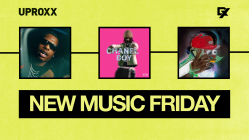There are infinite ways of knowing. The mind, body and soul connect the subconscious mind with tangible consciousness to create a dialogue that feels both spiritual and grounded to Earth. With the release of sprawled lyrics from a notepad to Navy Blue’s microphone, Sage Elsesser’s voice finds solace in itself. His latest project, Ways of Knowing, is a gentle reminder that if you miss your physical home, a simple 16-barS can transport you there, all the same.
Although not technically part of the Song of Sage quadrilogy, Post Panic! plus three limited edition, physical-only releases (i.e., Gift of Gabriel: Rain’s Reign!, Crypt of Carlos: Onward!, Arc of Atreyu: Neverending), Navy Blue’s latest release continues the spiritualism of his past releases. Specifically, Sage pulls from “Alignment” on Post Panic!, where he mutters to himself over and over again on the outro, “My body, my soul, my spirit aligned.”
Fully recorded with the LA-based producer, Budgie, Ways of Knowing is a meditation on mindfulness and reconnecting with one’s self through the transience of life’s ups and downs, maneuvering through grief and depression, love and the labors of vulnerability. Although these aren’t new thematic developments for Sage, the approach to working with a singular producer is an act of trust for the multi-hyphenate artist. Whether he’s modeling for Supreme, skating for Ace Trucks, producing full tapes for Akai Solo and ANKHLEJOHN (i.e., True Sky and As Above, So Below), or rapping as he has since his first release in 2015, there’s been a notable hesitance in his discography in terms of stepping away from his role as a producer. Although the result has been a gorgeous dilation of soul loops and acoustic drum kits, the engulfment in his own work fused Sage to a distinctive sound that’s equal parts lo-fi and neo-nostalgic diaspora yearning for a place in the world.
With Ways of Knowing, Navy Blue peels back yet another layer of his chinked armor. He relinquished the reins of production to Budgie — one of the few artists who understands how to bridge the gap between Hip Hop and gospel, as seen with his Grammy-winning production credit on Ye’s “Every Hour” on Jesus is King. Navy Blue needed to take his hands off of the production in order to breathe and, as he emphasizes on the opening track, “speak truth now as always.” “Medium” is Sage tearing off his “goddamn muzzle,” a reference to early memories of biting his tongue and biting his teeth, muted by his own apprehension.
The darkness of Ways of Knowing is constantly undermined by a sense of hopefulness and herculean purpose. Whether it’s the cheerful reggae of “To Fall In Love” or the pensive timbre of “The One,” Sage sings with his pedestrian voice about first loves and the youthful infatuations that keep us going from day to day. He depicts a true love that has been set free, juxtaposed with the meandering love for himself that can pull him in and out of depression at a moment’s notice. Although the songs aren’t pitch perfect, the fallibility of his voice becomes a reminder that Sage is finally letting his guard down, now placing his own humanity at the forefront of his music.
Over the live instrumentation that his music was always destined to cross paths with, Navy Blue grapples with mortality and the inevitability of loss. Sage navigates the loss of his grandfather and the inescapable aging of his grandmother through a musical séance. Etched with Biblical references and the mundane, overlooked eccentricities that made this couple so essential to his ways of knowing. Sage watches his grandmother scavenge through her jewelry box on “Pillars”: “Grandma want her earrings, she so vain, vain, vain.” This is a woman who couldn’t help but look her best in the presence of her grandson, the living embodiment of her late-husband, the man who Sage claims “taught me how to be a man.”
The religious sacrament of tracks like “Pillars” and “Life’s Terms” bring Navy Blue closer to the ones he has either lost or fears losing. These songs play like a pre-mortem obituary; on the latter track, Sage claims: “Dealing with a death, I’ve been a pallbearer. All the worry that my palms bear, I’m turning sorrow to self-care.” As if he’s communicating with his loved ones on the other side, Sage pushes through his acts of self-harm and self-induced isolation with a newfound optimism. He denounces his fears of death and loss, turning what had once been a ball-and-chain of existential dread into a constant reminder of gratefulness.
Decorating Navy Blue’s Def Jam debut with slithering prods towards his own psyche, Budgie mixes turntablism with paranoid guitar chords on “Kill Switch” and recreates a menacing, decelerated soundscape oddly-reminiscent of Biggie’s “Hypnotize” on “Freehold.” On an album embossed with harmony and poetry, these songs contextualize Sage’s winding path towards home – both in terms of finding his place in the world, and carrying the spirit of his family wherever he goes. Navy Blue cements these feelings in his hushed closer, “Shadow’s Shield,” explaining: “My pain present, I can’t make it go away…. I can’t hide behind this smile like I hide behind this shield.” Opening and closing with voicemails from his mother and father, respectively, Sage ends the album one step closer to peace and acceptance.









